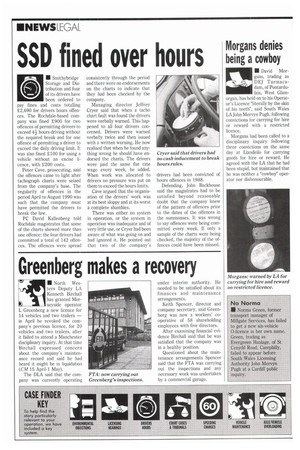SSD fined over hours
Page 18

If you've noticed an error in this article please click here to report it so we can fix it.
• Smithybridge Storage and Distribution and four of its drivers have been ordered to pay fines and costs totalling £2,690 for drivers hours offences. The Rochdale-based company was fined £900 for two offences of permitting drivers to exceed 41 hours driving without the required break and for one offence of permitting a driver to exceed the daily driving limit. It was also fined £100 for using a vehicle without an excise licence, with £200 costs.
Peter Cave, prosecuting, said the offences came to light after tachograph charts were seized from the company's base. The regularity of offences in the period April to August 1990 was such that the company must have permitted the drivers to break the law.
PC David Kallenberg told Rochdale magistrates that some of the charts showed more than one offence: the four drivers had committed a total of 142 offences. The offences were spread consistently through the period and there were no endorsements on the charts to indicate that they had been checked by the company.
Managing director Jeffrey Cryer said that when a tacho chart fault was found the drivers were verbally warned. This happened to all four drivers concerned. Drivers were warned verbally twice and then issued with a written warning. He now realised that when he found anything wrong he should have endorsed the charts. The drivers were paid the same flat rate wage every week, he added. When work was allocated to drivers no pressure was put on them to exceed the hours limits.
Cave argued that the organisation of the drivers' work was at its best sloppy and at its worst a complete shambles.
There was either no system in operation, or the system in operation was inadequate and of very little use, or Cryer had been aware of what was going on and had ignored it. He pointed out that two of the company's drivers had been convicted of hours offences in 1988.
Defending, John Backhouse said the magistrates had to be satisfied beyond reasonable doubt that the company knew of the pattern of offences prior to the dates of the offences in the summonses. It was wrong to say offences were being committed every week. If only a sample of the charts were being checked, the majority of the offences could have been missed.
























































































